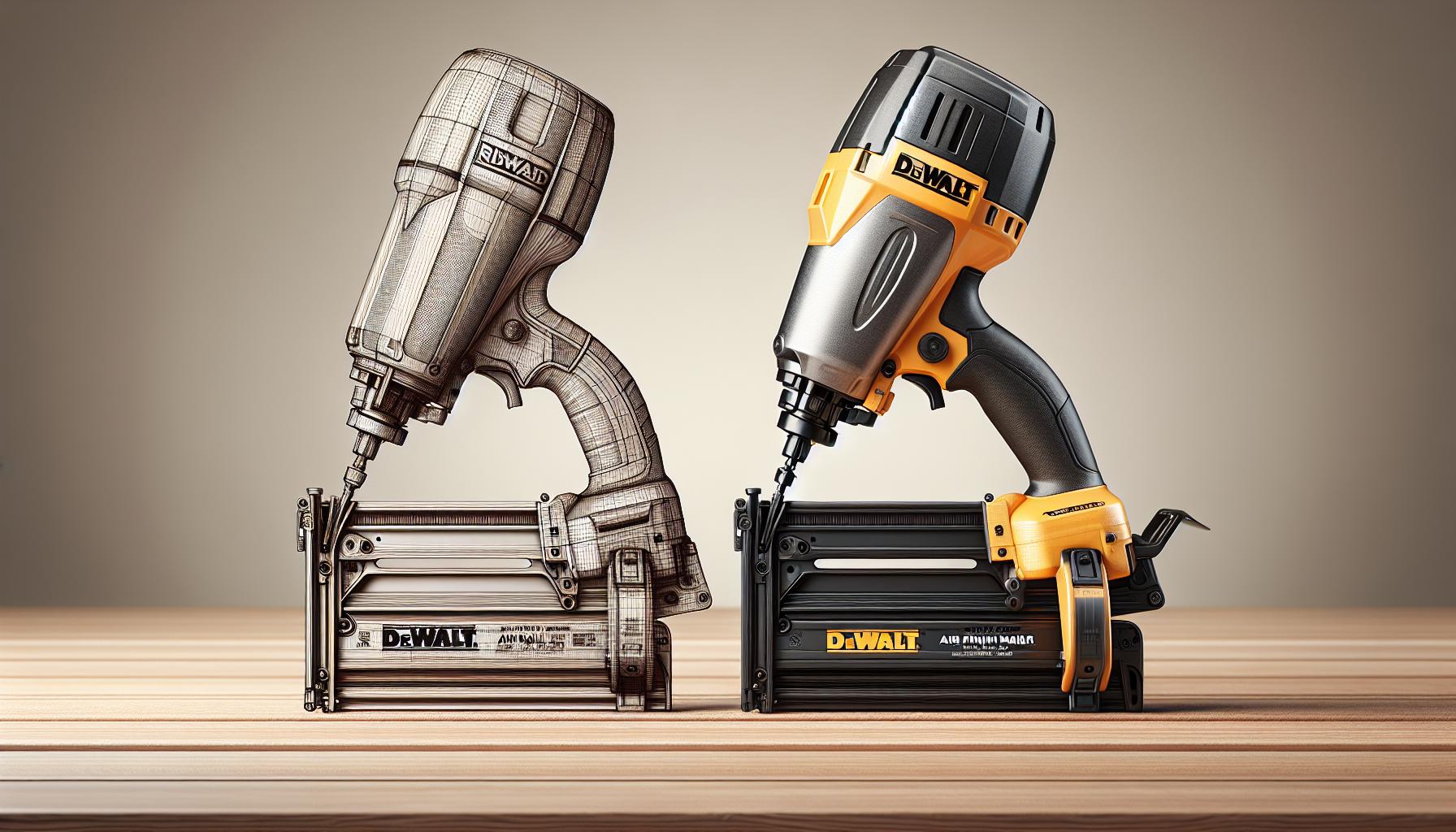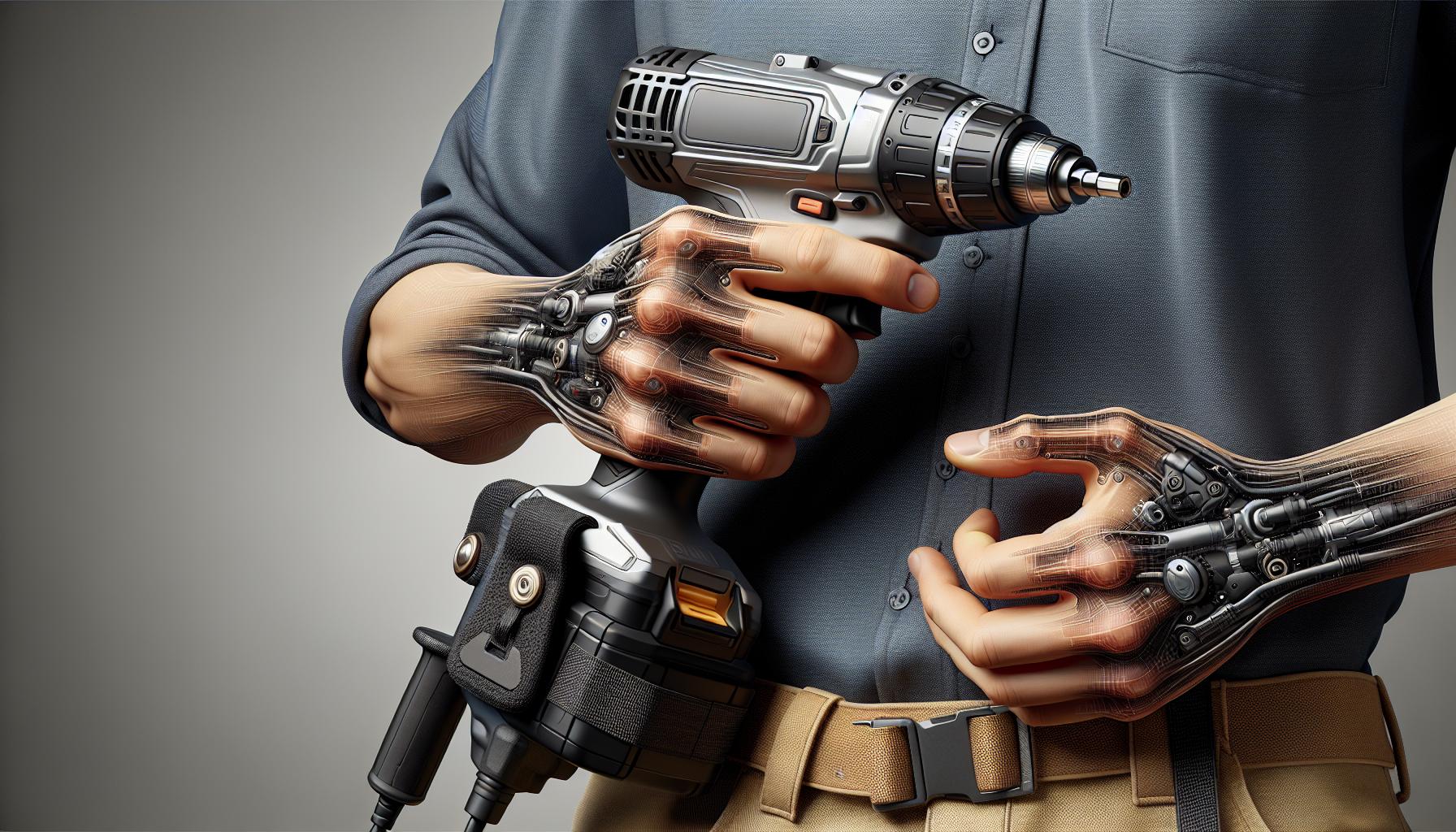When it comes to precision nailing, the right tool can make all the difference. That’s why I’m diving into the DeWalt vs. Ridgid air finish nailer debate. Both brands have loyal followings and boast features that promise efficiency and reliability.
I’ve used my fair share of finish nailers, and I know that the nuances between models can be the deciding factor for a flawless finish. So, let’s put these two powerhouses under the microscope and see which one nails it in terms of performance, durability, and value for your projects.
Features and Specifications
When comparing DeWalt and Ridgid air finish nailers, it’s essential to drill down into the features and specifications that distinguish these tools. Weight, nail size compatibility, and magazine capacity are pivotal factors that affect a user’s day-to-day experience.
DeWalt’s finish nailers are known for their robust build quality. One feature that stands out is the precise depth-of-drive adjustment, which lets you control nail depth with incredible accuracy. The models typically support nail sizes from 1″ to 2.5″ and feature a rear exhaust to keep contaminants away from the work surface. Most DeWalt nailers boast an impressive magazine capacity, allowing for extended periods of use without the constant need for reloading.
Conversely, Ridgid finish nailers excel with their SureLock™ technology, ensuring nails are secured to prevent blank drives. Ridgid models also support a similar range of nail sizes and provide a swift EZ Jam Release utility for reduced downtime. Additionally, they often include LED lights, a godsend for working in poorly lit areas. The trade-off for the added features tends to be a slight increase in weight, which could impact user fatigue over long periods.
Here’s a high-level comparison of key specs for both brands:
| Feature | DeWalt | Ridgid |
|---|---|---|
| Nail Size | 1″ – 2.5″ | 1″ – 2.5″ |
| Magazine Capacity | High | Moderate to High |
| Depth Adjustment | Precise Depth-of-Drive | Easily Adjustable |
| Jam Release | Standard | EZ Jam Release |
| Specialty Features | Rear Exhaust | SureLock™ Technology, LED Lights |
| Weight | Moderate | Slightly Heavier |
Performance Comparison
When it’s time to choose between DeWalt and Ridgid air finish nailers, performance is a key factor. I’ve spent a good amount of time working with both brands and have gathered valuable insights into how they stack up against each other. The nail firing rate is one aspect where you can see a clear distinction. DeWalt nailers are known for their consistency and speed, which is crucial when working on larger projects that demand efficiency.
On the other hand, Ridgid nailers might not match the firing rate of DeWalt, but they’ve built a reputation for reliability under various conditions. They tend to have fewer misfires and jams, a point often brought up by professionals who require a dependable tool on the job site. This is particularly beneficial when working with delicate trims where a misfire can mean wasted time and materials.
Air pressure requirements are another area to consider. Both brands operate within similar PSI ranges, but the specific requirements can affect the nailer’s performance. Being mindful of the compressor you’re using is important as it directly correlates with the nailer functionality – higher PSI might translate to more driving power but can also wear down the tool faster if not managed correctly.
As for the tool lifespan, DeWalt air finish nailers are often touted for their longer durability. With proper maintenance, these nailers can serve you well for an extended period, which is a smart long-term investment for any contractor or DIY enthusiast.
While the actual performance can vary slightly depending on the model, these characteristics give a general idea of what each brand offers. When making your decision, weigh the importance of speed, reliability, air pressure requirements, and durability to find the nailer that meets your specific needs. Remember, the best choice is one that aligns with the demands of your projects and works seamlessly within your workflow.
Durability and Reliability
When it’s time to choose a finish nailer, you’re not just looking at the immediate job at hand; you’re investing in a tool that should stand the test of time. DeWalt and Ridgid both offer models designed to endure, but they tackle durability and reliability in different ways.
DeWalt finish nailers are built with robust, lightweight materials. Their magnesium body is a definite plus, offering a unique combination of strength and portability. This ensures that I’m not weighed down when working on projects that require a lot of movement. Often, DeWalt nailers are subjected to drop tests to guarantee their ruggedness, an assurance that resonates with professionals and DIY enthusiasts alike.
In contrast, Ridgid nailers push the envelope with their die-cast construction. They seem almost to dare you to challenge their endurance. Moreover, Ridgid’s commitment to reliability extends to their lifetime service agreement, which covers parts and service for life. This promise is a testament to their confidence in the nailers’ longevity and can be a game-changer when I’m mulling over my options.
| Brand | Body Material | Warranty |
|---|---|---|
| DeWalt | Magnesium | 3-Year Limited Warranty |
| Ridgid | Die-Cast | Lifetime Service Agreement |
It’s crucial not to overlook the wear and tear these tools can endure on a job site. Both brands have good track records for withstanding harsh conditions. But as I’ve found, the true test for these nailers lies in their consistent performance over time. Frequent use, exposure to dust, and accidental drops are part of their everyday life. My experience aligns with users’ reports that both DeWalt and Ridgid finish nailers hold up well under pressure.
Maintenance also plays a pivotal role in longevity. The ease of disassembly and availability of replacement parts contribute to the upkeep of the nailers. DeWalt’s user-friendly design allows for quick access to jammed nails without requiring a slew of tools. Ridgid, on the other hand, has proven that their nailers are less prone to jam, which means I’m spending less time on maintenance and more on getting the job done.
Ease of Use
When selecting an air finish nailer, ease of use is a crucial factor for professionals and DIY enthusiasts alike. DeWalt’s air finish nailers stand out with their ergonomic design, reducing the strain on my hand during extended use. The rubber grip enhances comfort and control, which is essential when precision matters. The lightweight nature of DeWalt nailers also means I can maneuver them in tight spaces without fatigue setting in.
On the other hand, Ridgid air finish nailers have their own set of user-friendly features. The swivel connectors that come standard with Ridgid models prevent the hose from tangling, ensuring that I can move freely around the workspace. They also offer tool-free depth-of-drive adjustments, allowing me to quickly adapt to different materials and work paces without breaking my workflow.
Tool maintenance is yet another aspect of ease of use. DeWalt models are known for their oil-free operation, which means less maintenance for me and no worries about oil stains on my workpiece. Ridgid nailers might require occasional oiling, but it’s a straightforward process that doesn’t take much time.
Here’s what grabbed my attention: Both brands have integrated belt hooks, which might seem minor, but they’re a game-changer on the job site. I can simply hang the tool on my belt as I reposition ladders or materials, keeping the nailer within arm’s reach and ready to fire.
Finally, the balance of a nailer can greatly affect user fatigue. DeWalt and Ridgid have both engineered their nailers to offer excellent balance. This means they feel right in my hand, are easy to control for long periods, and they don’t tip forward when I set them down between uses. Whether I’m working overhead or at odd angles, this balancing act is a subtle feature that significantly enhances overall ease of use.
Value for Money
When it comes to getting the most bang for your buck, DeWalt and Ridgid finish nailers offer compelling arguments. I’ve noticed that DeWalt nailers, with their durable build and long-standing brand reputation, often come at a premium. However, they’re designed to last, and I’ve found that DeWalt’s warranty provides an additional sense of security. On the other hand, Ridgid air finish nailers frequently capture attention with their competitive pricing and impressive lifetime service agreement.
To break it down, here are some considerations that contribute to the value assessment of each brand:
- Initial Purchase Cost: Typically, Ridgid nailers come in at a lower price point than their DeWalt counterparts.
- Longevity: Both brands boast durability, but DeWalt has a slight edge in construction quality.
- Maintenance Costs: Due to their oil-free design, DeWalt models may save you time and money on maintenance.
- Warranty and Service: DeWalt offers a potent warranty, while Ridgid provides a lifetime service agreement, which is hard to beat.
| Brand/Model | Price | Warranty | Maintenance Needs |
|---|---|---|---|
| DeWalt DWFP71917 | $$$ | 3-year limited | Low (Oil-free) |
| Ridgid R213BNE | $$ | Lifetime Service | Moderate (Requires oiling) |
It’s worth noting that while upfront costs are certainly important, I always consider the total cost of ownership when evaluating the value for money. With Ridgid’s lifetime service agreement, you might end up spending less over the life of the nailer, despite the occasional maintenance costs.
That being said, the availability of parts and ease of service can greatly affect the real-world costs of owning and operating these nailers. I’ve found that DeWalt parts are widely available and that their service network is extensive, which means less downtime and more productivity. Ridgid, while offering impressive service terms, sometimes has longer wait times for repairs, which can be a consideration for professionals who rely on their tools daily.
Conclusion
Deciding between DeWalt and Ridgid air finish nailers boils down to what you value most in your tools. If you prioritize longevity and a robust service network, DeWalt’s reputation for durability and easily accessible parts might sway you. On the other hand, if upfront cost and a lifetime service agreement speak to you, Ridgid could be your go-to choice. Remember, the total cost of ownership is a critical factor, so weigh the long-term benefits against the initial investment. Whichever you choose, you’re investing in a tool that’s designed to meet the demands of your projects with precision and reliability.
Frequently Asked Questions
Which brand of air finish nailers is more durable, DeWalt or Ridgid?
DeWalt air finish nailers are generally praised for their durability and they come with a reliable warranty, which may suggest a longer lifespan for these tools.
Are Ridgid air finish nailers more affordable than DeWalt’s?
Yes, Ridgid air finish nailers are known for their competitive pricing and also come with a lifetime service agreement, making them an affordable option.
What should I consider when thinking about the total cost of ownership for air finish nailers?
When considering total cost of ownership, factor in the initial purchase price, maintenance costs, availability of parts, and service network. Both brands offer different advantages in these areas.
Are parts for DeWalt air finish nailers easy to find?
Yes, parts for DeWalt air finish nailers are widely available due to their extensive service network.
Does the Ridgid brand offer a warranty or service agreement for their air finish nailers?
Ridgid offers a lifetime service agreement for their air finish nailers, which can be very beneficial despite potential longer wait times for repairs.



Reader Interactions